STOCKHOLM, July 20 (Reuters) – Sweden-based automaker Volvo Cars (VOLCARb.ST) reported a 54% fall in second-quarter operating earnings on Thursday as the year-ago period’s profit was boosted by a one-off gain, and it forecast healthy demand for its vehicles despite pricing pressures.
Volvo Cars, majority-owned by China’s Geely Holding (GEELY.UL), said earnings before interest and taxes (EBIT) fell to 5.0 billion Swedish crowns ($488.62 million) from 10.8 billion crowns a year ago.
The company said the reason for last year’s high profit was a one-off non-recurring accounting effect from Polestar’s listing. Excluding joint ventures and associates, its second quarter EBIT for 2023 was up at 6.4 billion crowns versus 4.6 billion a year ago.
Analysts polled by Refinitiv had expected an adjusted EBIT of 5.2 billion, according to Refinitiv estimates.
Volvo said its sales performance was driven by improved production and that it expected supply and demand to continue to normalise in the wider markets.
The company added that the normalisation would bring some additional pricing pressures, but that demand for its cars was expected to be healthy despite high interest rates squeezing its customers and overall markets.
Automakers such as Volvo have begun slowly emerging from an extended period of supply chain pain, not least chip shortages and production disturbances in China, which have hit output and driven up costs.
While soaring inflation and higher prices on raw materials such as lithium have also weighed, Volvo has seen robust demand for its models, which it aims to be all-electric by the end of the decade
The company’s margins on fully electric cars were impacted in this period because the lithium used in these cars was sourced when prices peaked during late 2022, Volvo said.
Its battery electric vehicles gross margin for the second quarter came in at 2.6% versus 21.4% for non-battery electric vehicles, which, according to Stifel analyst Daniel Schwarz shows the widening gap between these vehicles, and the deteriorating profitability of battery electric vehicles.
Volvo’s shares were down nearly 2% at 0908 GMT.
The Gothenburg-based company added that for the second half of 2023 it would benefit from lower lithium prices as well as increased pricing on some of its fully electric cars, and as a result it expects the margins on its fully electric cars to improve in the coming quarters.
Volvo reiterated its guidance of solid double-digit growth in retail sales for the full year.
($1 = 10.2329 Swedish crowns)











